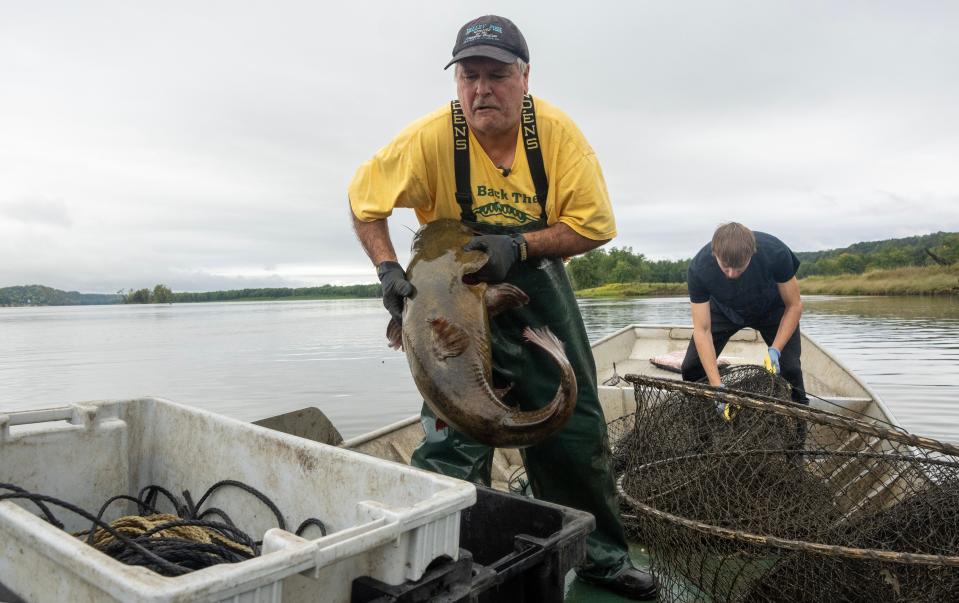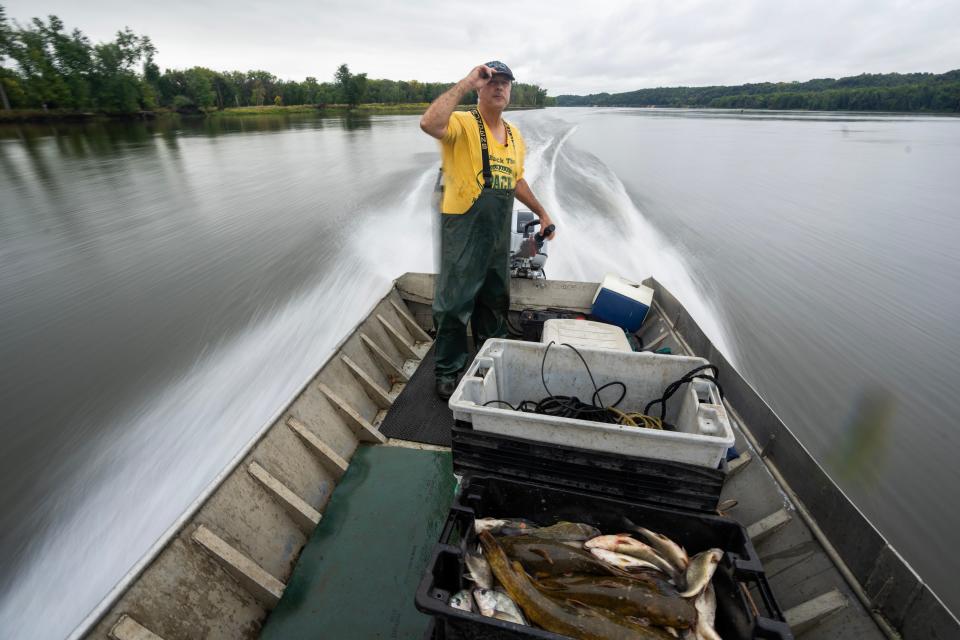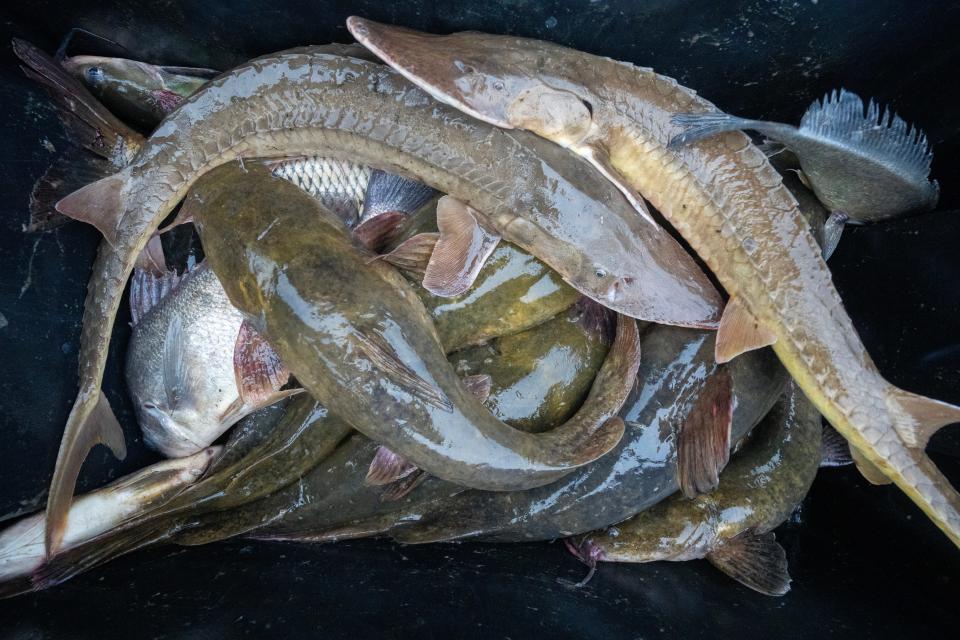Dozens of commercial fishermen used to work the upper Mississippi River. Now, a way of life is winding down.
MISSISSIPPI RIVER NEAR CASSVILLE - There's an art to setting a fishing net, and Mike Valley is a veritable Picasso.
When he's out on the Mississippi River, the current changes every day, and precision matters. He inches forward, leans over the edge of his boat and drops the net in the water. If it goes to plan, the current will hold the net open for fish to swim in.
People fishing nearby will watch his careful routine and ask him how he knows exactly where to set it.
His answer? "You just know."
If anyone's qualified to "just know," it's Valley — a 62-year-old fourth-generation Mississippi River fisherman who's made a living selling his catches from the river at his store in Prairie du Chien, Valley Fish & Cheese. In his decades on the job, he's caught countless catfish, hackleback sturgeon, sheepshead, bigmouth buffalo and carp. He's become intimately acquainted with the Mississippi, taking note of its routine fluctuations and of bigger shifts in its culture and ecosystem.
One of those big shifts: There are just a handful of commercial fishers left on his stretch of river, down from a once-booming industry, as people have moved further away from the idea of the river as central to their livelihoods and veered toward easier ways to make a living.
Valley knows he's among the last of a dying breed. He wants people to realize they shouldn't take his work for granted, but also knows people often don't appreciate something until it's gone.

A once-thriving industry is nearing its end
These days, Valley heads out to the river to fish twice a week. On a recent trip, he netted 700 pounds of flathead catfish about 40 miles downriver from home, cleaned them up, and was awake hours before sunrise the next day to put them on the smoker.
Valley began his career catching fish and selling them wholesale — that is, selling in bulk to retailers and restaurants. But in the early 1980s, he watched the wholesale industry start to struggle and found a niche selling his own product instead.
In his store, a quirky market that's been featured on PBS's Wisconsin Foodie, he prides himself on delivering something unique. Over the years, he's produced catfish jerky, snapping turtle summer sausage and jalapeño cheddar catfish bologna, to name a few.
"Nobody's going to go to your store, go home ... and say, 'You ain't gonna believe it. I went to this place in Prairie du Chien and this guy had beef jerky!'" Valley joked. "You've got to create something different. Then they go home and tell people, and word spreads."
But as he weighs retirement with no one willing to take over the store, area residents may soon have one less option to buy their fresh fish and other specialties. And that's in an already sparse market. Historically, most river towns had a fish market, Valley said. Today, there's just a few left.
A similar situation has been brewing for years out on the river itself, where the number of fishers selling commercially has been on the decline for decades. Commercial fishing on the upper Mississippi peaked in the mid-1960s, according to a 2018 study in Fisheries Magazine, when the industry produced more than 6,000 tons of fish and generated about $9 million.
Today, data from the Wisconsin Department of Natural Resources shows a steady drop in commercial fishing licenses issued for the Mississippi River. In one category, the number of licenses issued had dropped from 144 in 2001 to 37 this year, for example.
When his father was fishing, Valley said, there were 125 commercial fishers on the Mississippi within a 60-mile radius of Prairie du Chien. At the start of his own career, he estimated there were between 50 and 60. In those days, he recalled getting into arguments with other fishers who thought they owned a certain spot.
Today, that's not a problem. He guesses there's no more than 10 of them left in that same radius.
And he suspects this fall will be his last fishing commercially. Though in his heart he wants to keep going, his body can't do it anymore.
"It's very enjoyable — raising the nets, catching the fish, the challenge, being on the river — but unfortunately you've got to clean them, and that's a lot of work," he said.
Valley predicts his fellow fishers who are still hanging on will follow suit soon. Nine of the 10 are over 50, and he said younger people and children have lost interest in the dying art. For his part, no one in his family is interested in taking it over.
Though Valley is loath to say the fun is gone, the steady drop-off makes him sad. In a decade, he thinks, they'll all be gone.
"Back when I was a kid, there didn't seem to be no end," he said. "Now, you really look, and you can actually see the end."

A changing river complicates the catch
As the commercial fishing industry dwindles, the river is more often being used for other purposes, Valley observes. He sees many more party boats and pontoons.
Though the region is popular for competitive bass fishing tournaments and other sport fishing events that pump dollars into the local economy, Valley takes a dim view of them too. As a self-described conservationist, he frowns on their use of the catch and release method to try and go after the best fish.
"If I go bass fishing and I want two bass to eat, I catch two bass and I go home," he said.
Having spent decades out on the Mississippi River, he's witnessed a litany of well-documented environmental changes, too: islands eroding; river backwaters becoming shallower as sediment fills in; and dying trees.
The floodplain forests of the upper Mississippi have been under threat in recent decades. Diseases and prolonged flooding are killing trees, at which point invasive plant species move in, making it impossible for healthy trees to take root.
More: The Mississippi River's floodplain forests are dying. The race is on to bring them back.
These decaying trees cause a particular problem for fishers like Valley if he's setting nets close to shore. Bump a boat too hard up against a dead tree, and it could come crashing down.
"(Out fishing) this spring, 10 times a day there'd be massive trees falling around me," he said. "It's extremely dangerous."
The trees killed by excess flooding are a symptom of climate-related changes at work in the Mississippi River basin. Climate scientists are predicting more weather extremes, like flash floods and droughts, to afflict the heart of the country as the climate grows warmer and wetter, affecting the intensity of precipitation.

These extremes have been on display in recent years where Valley fishes. This past spring, many towns along the upper Mississippi saw near-record flooding, including McGregor, Iowa, across the river from Prairie du Chien, where the river hit its third-highest crest on record on April 28.
Valley described this year's spring fishing as "phenomenal," but it didn't last long. The region went into drought weeks later, resulting in the worst summer for catching catfish he'd ever experienced. He only cast six nets that brought up between 500 and 1,000 pounds of fish, in comparison to recent weeks, in which he's been able to cast almost four times as many nets.
Although things have changed, Valley said he still has hundreds of fond memories to remember on his way out the door.
Many of those involve impressively large fish.
People always want to know about the biggest catfish he's ever caught. That would be at age 16, when he pulled in two nearly 100-pound catfish in one net while out fishing with his father.
"You always thought, 'There'll be one bigger tomorrow,'" he recalled.
Madeline Heim is a Report for America corps reporter who writes about environmental issues in the Mississippi River watershed and across Wisconsin. Contact her at 920-996-7266 or mheim@gannett.com.
Please consider supporting journalism that informs our democracy with a tax-deductible gift to this reporting effort at jsonline.com/RFA or by check made out to The GroundTruth Project with subject line Report for America Milwaukee Journal Sentinel Campaign. Address: The GroundTruth Project, Lockbox Services, 9450 SW Gemini Dr, PMB 46837, Beaverton, Oregon 97008-7105.
This article originally appeared on Milwaukee Journal Sentinel: Prairie du Chien fisherman one of few remaining on Mississippi River

